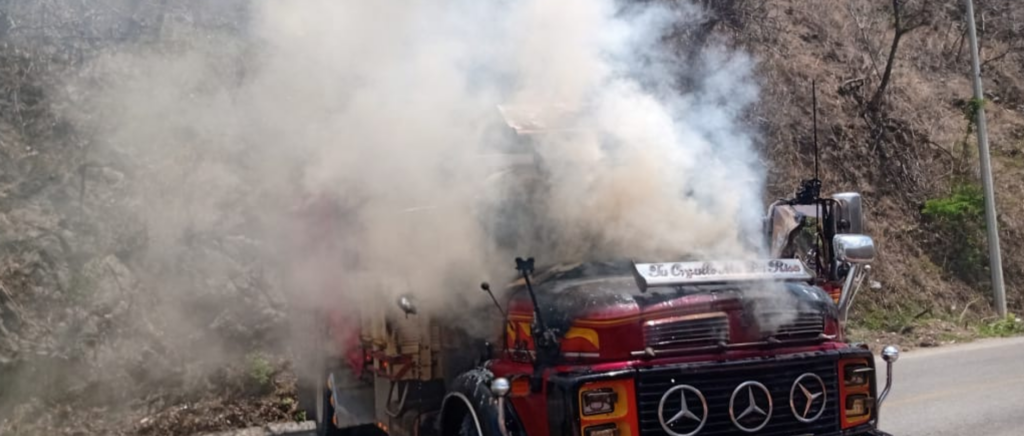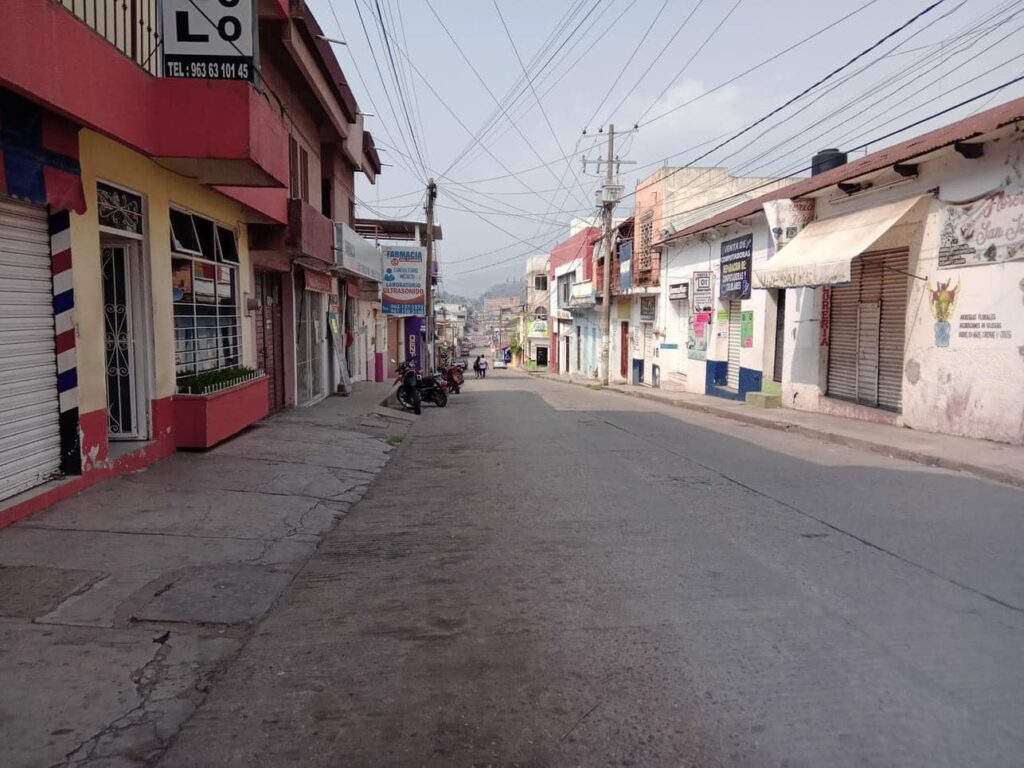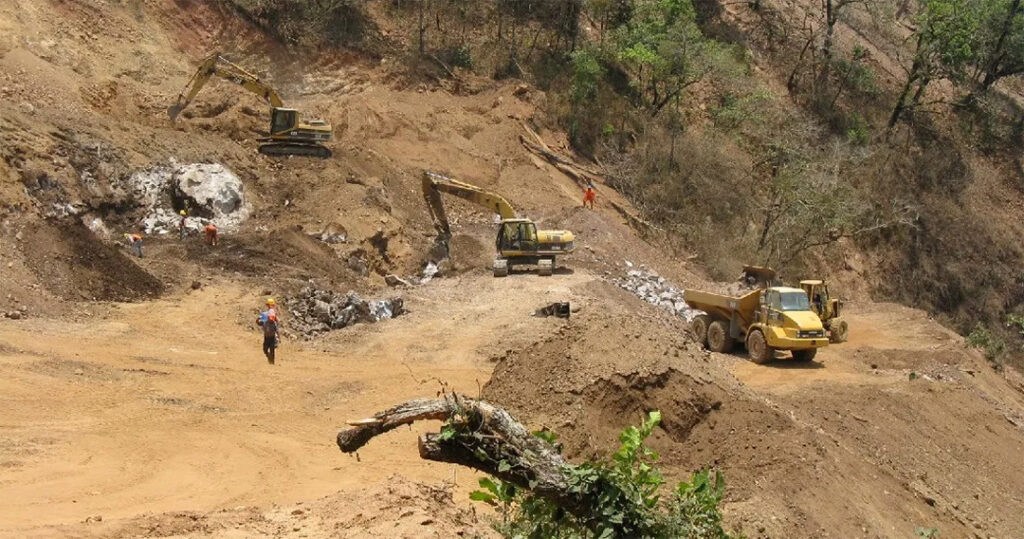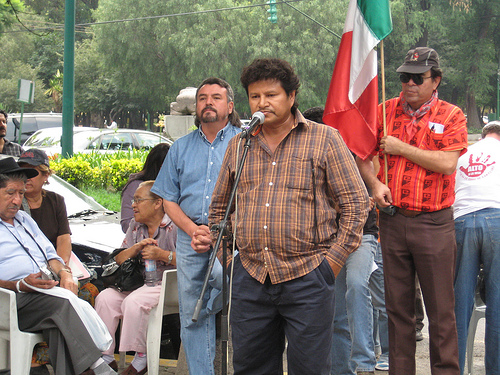Renata Bessi and Aldo Santiago

On Thursday May 25th, in the southern zone of Chiapas, a border region between Mexico and Guatemala, clashes broke out between members of the Sinaloa Cartel and the Jalisco Cartel – New Generation (CJNG).
Throughout the day, audio messages were circulated to alert the population of the violent events. There also appeared banners and graffiti left by organized crime groups. The testimonies of inhabitants of the region stand out, who report that armed people have entered homes to force young men to participate in the confrontations, under the threat of being killed.
They also report that entire communities have been cut off from communication due to road and highway blockades, burning of vehicles, suspension of classes and power outages.

The area of conflict extends along a strip that includes localities such as Pacayalito, exit towards the municipality of Motozintla, as well as in the ejido Tres Maravillas, further into Mexico, in the direction of Chicomuselo.
The ejido Nueva Morelia, in Chicomuselo, was already controlled by armed men since Saturday, May 20, as reported by local residents, by the paramilitary group MAIZ, linked to the Sinaloa Cartel. At the same time, the entrances and exits of the town were blocked by members of this group.
So much so that on the same Thursday, May 25, Milton Morales Zunun, of the Social Movement for the Land (MST) was disappeared at one of the exits of Chicomuselo by subjects belonging to MAIZ. “He was on his way to Tuxtla Gutiérrez to see his daughter,” according to the movement. The defender was found alive hours later.
The reason for the paramilitary group’s control is mining activity. The municipality of Chicomuselo is located on a large barite reserve. The Canadian mining company Blackfire Exploration exploited one of the ten concessions currently in force in Chicomuselo, the Ampliación La Revancha mine, until 2009, located in the Grecia ejido, next to the Nueva Morelia ejido.
Blackfire Exploration, according to the Mining Permit issued by the General Directorate of Mines of the Ministry of Economy, still holds the concession title for this mine. According to the same document, the original concession title was in the name of Tristán Canales Reyna and the cession of rights was granted to the Canadian mining company in 2007.
Blackfire, according to Juan José, an inhabitant of Nueva Morelia, who will not be identified by his real name for security reasons, had requested permission from the ejido to store the material it extracted in the Grecia ejido. This location is known as “La Plataforma.” After the mining company left the territory in 2009, part of this material remained closed.

Juan recounts that workers from some companies have previously shown up with the objective of extracting material. “They would leave because we told them no. The community assembly would remove the material. The community assembly took minutes that established that the material would not be extracted and they respected that,” he says.
But this time it was different. Armed men showed up for the first time, on May 17, to the ejido authorities. “They didn’t show up asking for permission, as others had done before, but now they said: “we are coming in because we are coming in, if you mess with us you know what will happen to you>”.
Two days later, on May 19, a community assembly was called. Once the meeting was over, the armed men showed up again, making new threats. “They said: everything will be calm; if you get involved you will see, you will know what will happen, we don’t want any social fighters, nobody, not even the Church or anything else to mess with us,” said Juan.
They warned that they were going to start removing the material as of Saturday, May 20, and that it would take between 8 and 10 days. “They began to loot, to haul until nighttime, many people came, with cars, trailers, machines. The ejido is vulnerable, there are children, women, the elderly. There is nothing more we can do,” he says, while the entire ejido was blocked.
Approximately eight months ago, Juan recalls, confrontations began in Paso Hondo, in Chamic, between Comitán and Comalapa. “People could no longer travel, they began to search the cars and began to take over communities. They began to charge a tax and put a logo on them. For example, a restaurant had a MAIZ logo, because they offered protection. The one that didn’t have a logo, they came and threatened. They were taking advantage, looting everything there is, taking advantage of the mining companies as well,” said José.
Agustín Ávila Romero, in charge of the Office of the General Directorate of the National Institute of Ecology and Climate Change (Inecc), of the Ministry of Environment and Natural Resources (Semanart), who has accompanied and issued notes of support to the community, recognizes that what is happening is the territorial control of drug trafficking. It had already been done, as José described, “in Frontera Comalapa and was extending towards Chicomuselo, with the threat to the compañeros, above all, with the use of a paramilitary group, which is involved in mining operations,” said Romero.
Now, with yesterday’s confrontation, “it (the situation) turns because the other cartel (Jalisco New Generation) enters into action and then sadly it is the most vulnerable who are already suffering at this time, because they are experiencing the displacement of people, a policy of total fear and terror,” said Avila Romero.
The State?
In an official letter signed by Romero and addressed to Daniel Nájera Piedra, Private Secretary of the President of the National Human Rights Commission (CNDH), dated May 18, he requests the “immediate intervention of the corresponding justice institutions to activate protection protocols for the defenders, as well as the immediate protection by the National Guard, state and municipal security forces, to safeguard and protect the people who are being directly threatened, as well as those who have been harassed by this group.”
The letter denounces that “the communities of the municipality are in a context of social conflict and violence, which is generated by organized crime groups, who have also been directly linked to companies dedicated to mining extraction.”
The CNDH responded that it would grant the precautionary measures, however, acknowledges Romero, “until now (May 25 at night) neither the Army, nor the National Guard, nor the state security forces have arrived in the area”.
According to Elisa Cruz Rodas, a specialist in socio-environmental conflict management, the border region of Chiapas “is no man’s land; these people come to the community and say: my company has no name, I’ll use my own guns; the role of the government should be to adhere to the rule of law and enforce the law.
Juan points out that for months now “they (armed groups) have been doing what they want, they have control of the municipality; they enter and leave the towns, they pass in front of the headquarters of the Sedena (Secretary of National Defense) and they don’t say anything to them”.
In a communiqué, the National Network of Civil Human Rights Organizations “All Rights for All” (Red TDT), the Guatemala-Mexico Cross-Border Migration and Gender Coordination Group (MTMG) and the Southern Border Monitoring Collective demand that “the Mexican State and the corresponding authorities intervene urgently to stop the violence and terror experienced in the border region of Chiapas.
Who buys?
Mining activity brings in more economic profit than drug trafficking itself does for criminal groups, Romero said. “The incredible thing is the whole system of opacity, of corruption that allows this, because it is not only the fact that armed groups arrive to threaten a board of directors of an ejido and demand the right of way to mine, but also the fact that the mine is finally going to extract a material and how is it sold in the market?
There is, according to the federal government official, a whole value chain around mining that goes through different stages that should have state control. “From the transports that are being used, to its arrival at customs, probably for export and processing in other countries.”
In addition, from the Grecia ejido to Tuxtla Gutiérrez or to Puerto Madero, “or wherever (the material) is being commercialized, well, there are hundreds of kilometers that go through different federal or state security controls; (…) the whole process of commercialization of these minerals is being done illegally,” he points out.
“So this is something that has been allowed to grow and that in the end is giving territorial control to criminal groups without the important presence that the Mexican State should have”.
Blackfire is not forgotten
The mine known as Ampliación La Revancha, located at kilometer 45 of the Chicomuselo-Barrio San Ramón stretch, in the Grecia ejido, was closed on December 7, 2009 for non-compliance with state environmental regulations.
In the resolution of the file of the Federal Attorney General’s Office for Environmental Protection (Profepa), Chiapas Delegation, June 2010, reviewed for this report, it states:
“at the site of the Ampliación La Revancha mine project, 3.5 hectares of oak vegetation were found to have been affected, which does not correspond to the vegetation authorized in the environmental impact assessment, and as a safety measure the total temporary closure of extraction activities was implemented.
However, the Red Mexicana de Afectados por la Minera (REMA) called the events that took place after the temporary closure “simulation as State policy”.
Blackfire Exploration even threatened to file a lawsuit against Mexico under the North American Free Trade Agreement (NAFTA) for 800 million dollars. However, it did not file the lawsuit.
Here is an account of the events based on a communiqué published by REMA-Chiapas in September 2010.
- On January 15, 2009, the person in charge of the Delegation of the Secretary of the Environment and Natural Resources in the State of Chiapas filed a public complaint for violations to environmental regulations, in relation to the change in land use of forest land due to mining exploitation by Blackfire Exploration.
- On January 26, 2009, Profepa’s office in Chiapas admitted the public complaint, opening file PFPA/14.7/2C.28.2/0017-09.
- On the same January 26, the territorial defender Mariano Abarca Roblero, along with other people, filed a public complaint against the exploitation of the mine by Blackfire Exploration, given the environmental irregularities.

- On February 5, 2009, the Profepa office in Chiapas accepted the popular complaint filed by Mariano Abarca Robledo and others, for the environmental contamination generated by the mine operated by Blackfire Exploration, opening the file PFPA/14.7/2C.28.1/0005-09.
- On November 6, 2009, a popular complaint was filed by the communities Nuevo Morelia, La Lucha, San Francisco Las Palmas and others, of the Municipality of Chicomuselo, Chiapas, against the mining exploitation of Blackfire Exploration. It was received by the Delegation of Profepa, which agreed to join it to the complaint filed by the Semarnat Delegation (file PFPA/14.7/2C.28.2/0017-09).
REMA, at the time, asks the question: What did the Profepa delegation do during the nine months between January 15, the first complaint, and November 26, 2009, one day before the murder of Mariano Abarca? And he answers: “Nothing. It covered up for the Canadian mining company Black Fire and never went to verify the reported violations until after the murder.”
In the first days of 2009, it integrated the file PFPA/14.7/2C.28.2/0017-09, as a result of Semarnat’s complaint, and sent inspectors and issued a total temporary closure of the mine, “due to the serious irregularities found”.
In spite of the fact that the “inspectors verified irregularities that appear in the file (PFPA/14.7/2C.28.2/0017-09), the most unprecedented thing was that Profepa issued an agreement, declaring that there was no irregularity on the part of the Blackfire company. In other words, all the damages found and documented by the Profepa inspectors themselves -through the Minutes in the file- were ignored by the Profepa delegation, to say the least”, states REMA.
In order for the decision “not to be blatantly obvious”, Profepa sanctioned Blackfire Exploration. In the sixth point of the same Agreement, “it imposes a fine of $261,443.00 pesos for the felling of trees on the border road between the Grecia and Nueva Morelia ejidos, “an amount that surely did not represent any detriment to the company’s assets, much less did it seriously change its extractive policy.”
“They only temporarily closed the mine as a distraction, a cover-up and impunity, and with the purpose of making people believe that the popular complaint was effectively addressed, when in reality, the resolutions issued have the intention of exempting the Canadian company Blackfire from any responsibility”, says REMA.
The complaint filed by Mariano Abarca “was never followed up on.”
“The indignation continues to guide our demand for punishment of the material and intellectual authors of this murder, as well as of the government officials who, by action or omission, allowed that, despite having received popular complaints about the serious violations of environmental regulations by the Canadian company Blackfire, they did not act in accordance with their powers. If they had done so, our colleague Mariano Abarca Robledo would still be alive”, concluded REMA in its communiqué.
Original article posted in Avispa Midia on https://avispa.org/crimen-organizado-toma-control-de-territorio-minero-en-chiapas/
English translation by Schools for Chiapas.
